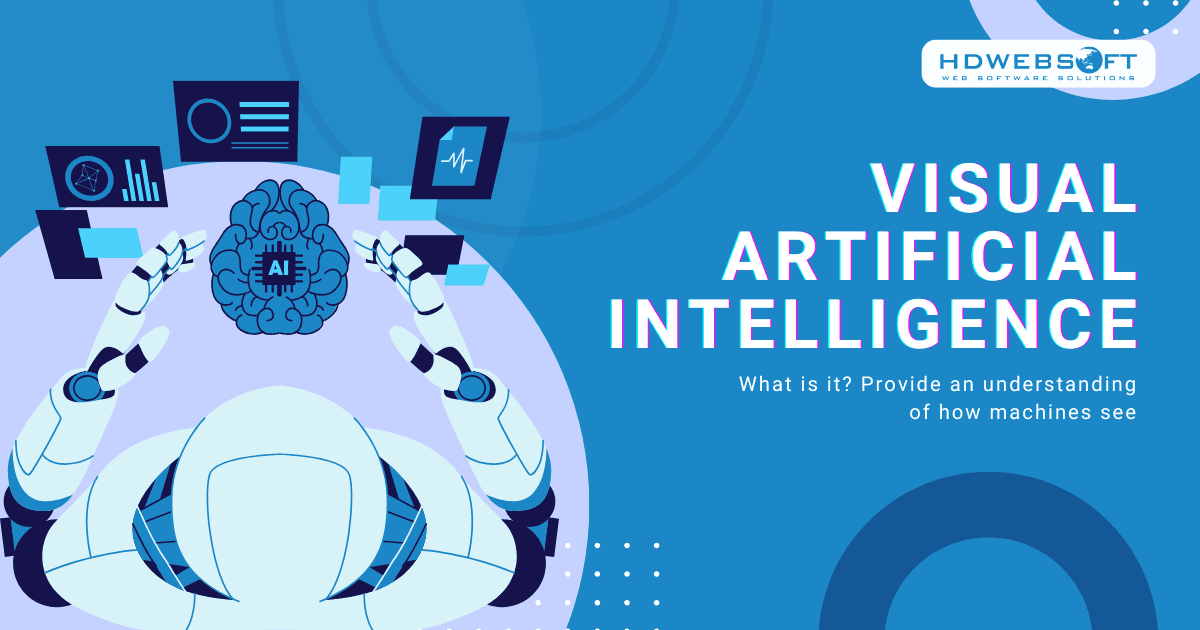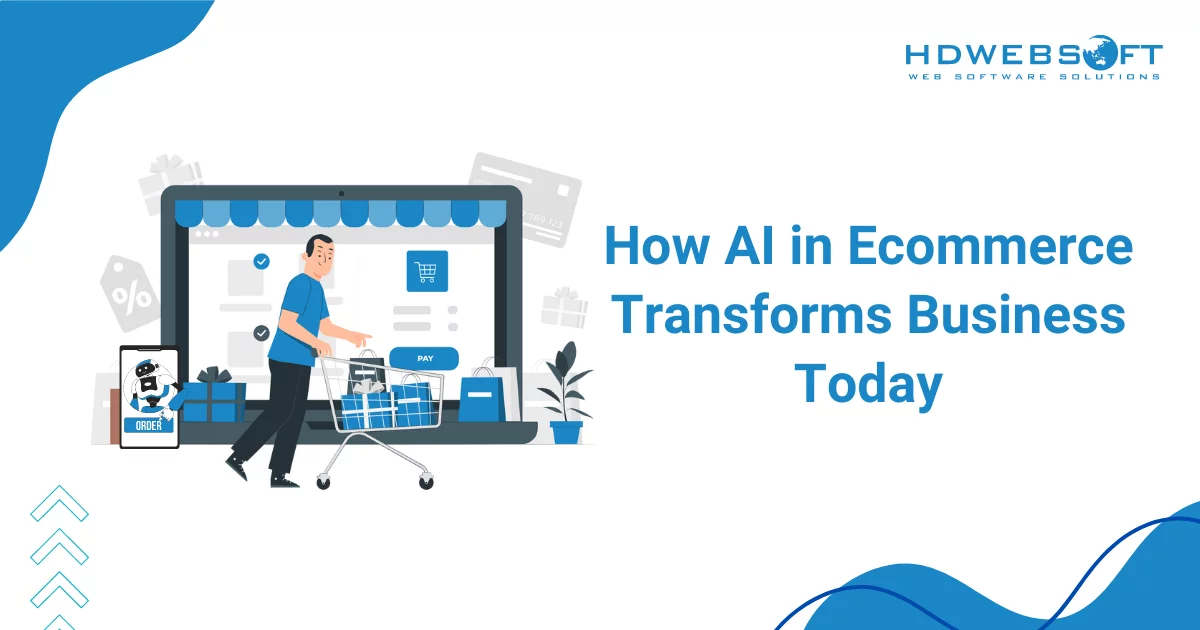
How AI in Ecommerce Transforms Business Today
AI in Ecommerce integration is rapidly transforming the online business landscape, driving significant changes across the industry. As eCommerce continues to evolve, Artificial Intelligence is emerging as a game-changer, reshaping how retailers interact with customers, manage operations, and stay competitive. From personalized shopping experiences to efficient supply chain management, AI’s influence on eCommerce is profound and far-reaching.
This blog will explore how AI is revolutionizing the ecommerce industry. We will delve into practical AI implementation strategies and discuss the technology’s promising future in online retail.
AI is bringing change to the Ecommerce Industry
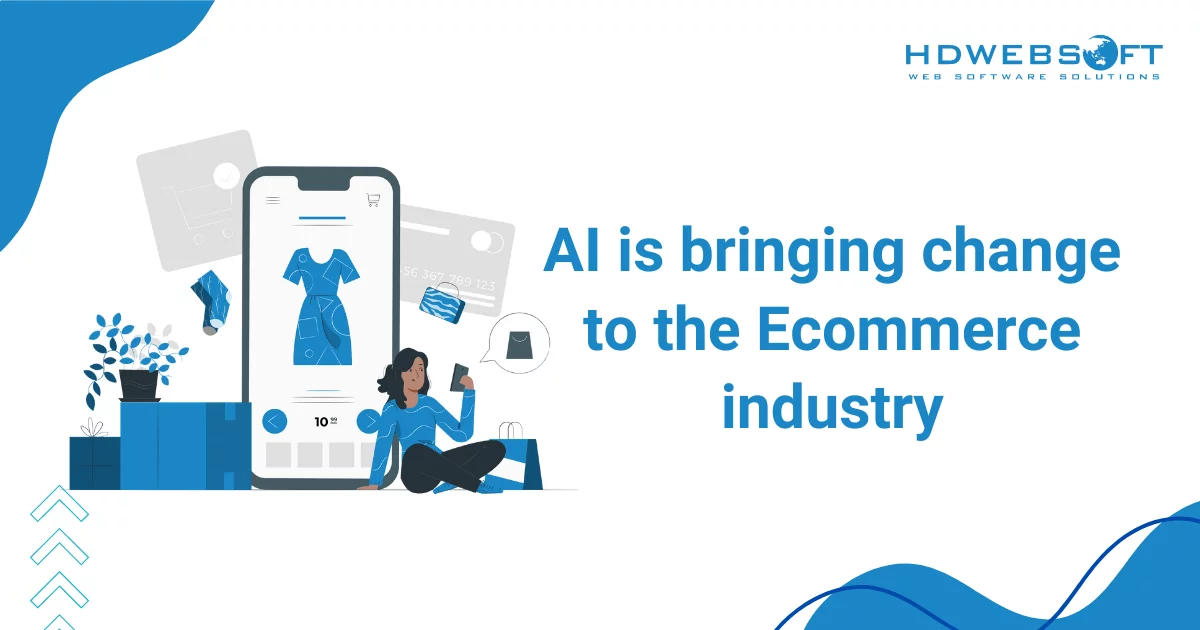
The adoption of AI in Ecommerce is transforming the industry in multiple ways. According to recent data, the global AI in the retail market is expected to reach $24 billion by 2027, driven by increasing demand for automated customer support and personalized shopping experiences. This growth is fueled by AI’s ability to analyze vast amounts of data, enabling retailers to understand customer behavior better and make data-driven decisions.
Moreover, a study found that 71% of online shoppers are more likely to purchase from a brand that offers personalized experiences. This statistic underscores the importance of AI in delivering tailored shopping experiences, which are now critical for eCommerce success. By leveraging Artificial Intelligence, Ecommerce platforms can offer product recommendations, dynamic pricing, and targeted marketing campaigns that resonate with individual customers.
AI Use Cases in Ecommerce Sector
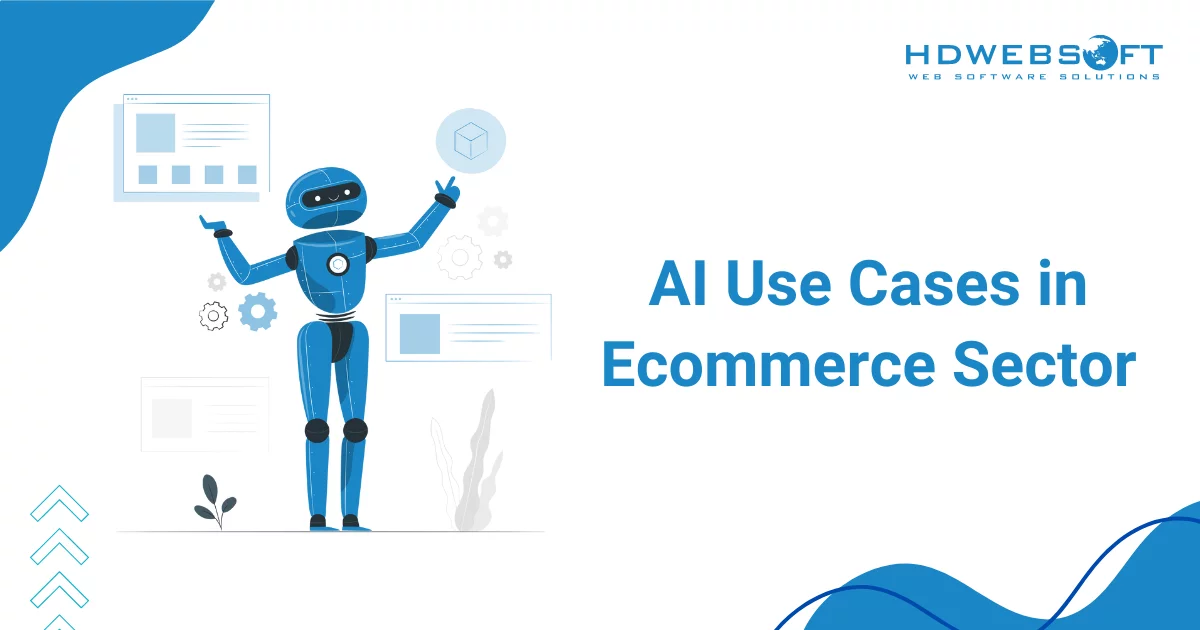
AI’s applications in eCommerce are vast and varied, each contributing to a more efficient and customer-centric shopping experience.
Personalized Product Recommendations
One of the most significant uses of AI in Ecommerce is the ability to provide personalized product recommendations. Artificial Intelligence algorithms analyze a wealth of customer data, including browsing history, purchase patterns, and even real-time behavior, to suggest products customers are most likely to buy. This level of personalization is not only convenient for the customer but also highly beneficial for the retailer.
As mentioned above, personalized recommendations can lead to higher conversion rates, increased average order value, and improved customer satisfaction. Major online platforms like Amazon and Netflix have long used AI-driven recommendations to keep users engaged and encourage repeat purchases.
Another crucial application of Ecommerce AI is improving search and navigation on eCommerce platforms. Traditional search engines often struggle with vague or ambiguous queries, leading to customer frustration. However, with Artificial Intelligence technologies like Natural Language Processing (NLP), Ecommerce platforms can now understand and process natural language queries more effectively. This means that customers can find exactly what they’re looking for, even if they don’t know the precise name or description of the product.
In addition to NLP, AI in Ecommerce also powers visual search technologies. Visual search allows customers to upload an image and find similar products available on the platform. This is particularly useful in the fashion and home decor industries, where customers often want to find items that match a specific style or aesthetic. By making the search process more intuitive and user-friendly, Ecommerce AI is helping retailers improve the overall shopping experience.

With AI in Ecommerce, customers can find their desired products in a few simple steps.
Automated Customer Support
The use of Artificial Intelligence for automated customer support is becoming increasingly common in the eCommerce industry. Ecommerce AI chatbots are capable of handling a wide range of customer inquiries, from answering questions about product availability to processing returns and exchanges. These AI-driven chatbots provide instant support 24/7, ensuring that customers receive timely assistance regardless of when they shop.
Its ability to learn and adapt sets AI in Ecommerce apart from traditional customer service solutions. Through ML, these chatbots continuously improve their responses by analyzing past interactions. Over time, they become more accurate and efficient, providing better customer support. This enhances the customer experience and reduces the workload for human customer service agents, allowing them to focus on more complex tasks.
Dynamic Pricing and Inventory Management
Ecommerce AI is also pivotal in dynamic pricing strategies. By analyzing factors such as demand, competitor pricing, and customer behavior, Artificial Intelligence can adjust prices in real-time to maximize sales and profitability. This dynamic approach to pricing helps retailers remain competitive in a fast-paced market and respond quickly to changes in demand.
In addition to pricing, AI is transforming inventory management. Predictive analytics powered by Ecommerce AI enables retailers to forecast demand more accurately, ensuring that popular items are always in stock and reducing the likelihood of overstocking. This not only optimizes inventory levels but also improves the overall efficiency of the supply chain.
Fraud Detection and Prevention
Fraud detection is another critical application of AI in the eCommerce sector. Ecommerce AI systems can monitor transactions in real-time, identifying patterns that may indicate fraudulent activity. By flagging suspicious transactions, these AI systems help protect both retailers and customers from fraud. Over time, as AI in Ecommerce systems learn from new data, they become increasingly adept at detecting and preventing fraud, providing an additional layer of security in online transactions.
Maybe you’re interested: AI in Banking – The Revolution in the Financial Sector.
How to Implement AI in Ecommerce
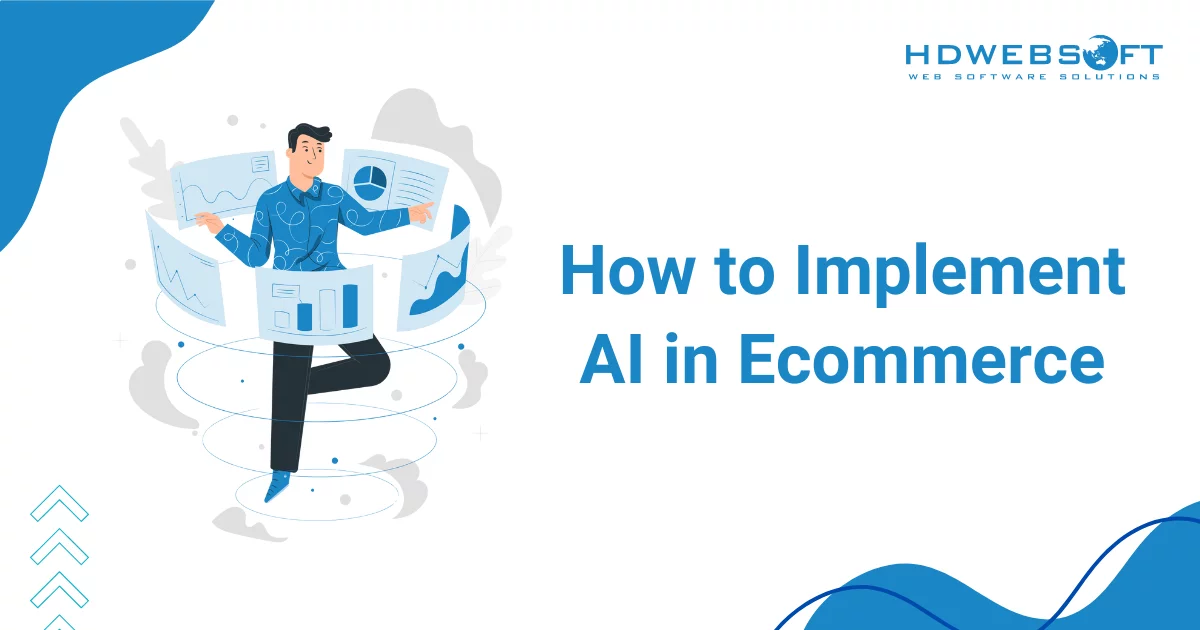
Implementing AI in Ecommerce can significantly enhance the efficiency and effectiveness of your online business. A successful AI integration into your eCommerce platform requires a strategic approach. Below are key steps to effectively implement Artificial Intelligence:
Identify Key Areas for AI Integration
The first step in implementing AI in Ecommerce is identifying which areas of your business will benefit most from AI. Common areas include customer service, product recommendations, inventory management, and pricing strategies. You can better determine where AI can have the most significant impact by pinpointing your eCommerce operations’ specific challenges or goals.
For example, if your goal is to improve customer retention, consider implementing AI-driven personalized marketing campaigns and product recommendations. If operational efficiency is your priority, focus on AI applications in dynamic pricing and inventory management.
Choose the Right AI Tools and Technologies
Once you’ve identified the key areas for AI integration, the next step is to choose the right AI tools and technologies. There are various AI platforms and software solutions available, each tailored to different needs within the eCommerce ecosystem.
Consider using AI algorithms to analyze customer data and suggest products for personalized product recommendations. For customer service, AI chatbots can provide instant support and handle routine queries, freeing up human agents for more complex tasks.
When selecting Ecommerce AI tools, it is essential to ensure they are scalable and compatible with your existing platform. Additionally, consider tools that offer analytics and reporting features, allowing you to track the performance and ROI of your AI investments. Tools like an AI caption generator can also enhance content accessibility, helping you reach a broader audience by automatically generating accurate captions for product videos.
Invest in Quality Data
AI in Ecommerce relies heavily on data to function effectively. High-quality, well-organized data is essential for AI algorithms to generate accurate predictions and insights. This means that investing in a robust data management system is crucial.
Start by ensuring your customer data is clean, up-to-date, and comprehensive. This includes demographic information, browsing behavior, purchase history, and any other relevant data points. The more data you have, the more precise your AI applications will be.
Additionally, consider implementing data collection tools that gather real-time data from various touchpoints, such as website visits, social media interactions, and customer service queries. This will provide your AI systems with continuous fresh data to improve their accuracy and effectiveness.
Train Your Team
Implementing AI in Ecommerce is not just about technology; it also requires human expertise. Your team must understand how to use AI tools and interpret the data they generate. Providing adequate training is essential to ensure your staff can effectively utilize AI applications and make data-driven decisions.
Training should cover both the technical aspects of AI tools and their practical applications within your eCommerce operations. This includes understanding how AI algorithms work, analyzing AI-generated insights, and integrating AI-driven strategies into your broader business plan.

Showing your team how to use AI in Ecommerce tools thoroughly is necessary.
Using Third-Party Expertise
While some businesses may develop and implement AI solutions in-house, many others find it beneficial to leverage third-party expertise. Ecommerce AI can be complex, and working with experts specializing in AI integration can help ensure a smooth and successful implementation.
Third-party AI providers often offer a range of services, from consulting and strategy development to deploying custom AI solutions tailored to your specific needs. They can also provide ongoing support and maintenance, ensuring that your AI applications perform optimally as your business grows.
Partnering with experienced AI vendors or consulting firms can save you time and resources, allowing you to focus on other critical aspects of your business while reaping AI’s benefits for Ecommerce.
Monitor and Optimize
After implementing AI in Ecommerce, continuous monitoring and optimization are crucial. Since AI systems are dynamic and require regular updates to stay effective, it is essential to use analytics tools to track the performance of your AI applications and identify areas where they can be improved.
Another vital point is to review the results generated by your AI systems regularly. For instance, the effectiveness of personalized recommendations, the accuracy of demand forecasts, or the efficiency of dynamic pricing. Based on these insights, make necessary adjustments to optimize your AI-driven strategies and ensure they continue to align with your business goals.
Future Prospects of Ecommerce AI

The future of AI in Ecommerce looks incredibly promising, with ongoing advancements set to further enhance the shopping experience. As AI technology evolves, we can expect even more sophisticated personalization, including hyper-personalized marketing strategies that cater to individual preferences in real time.
Additionally, the integration of AI with other emerging technologies like Augmented Reality (AR) and Virtual Reality (VR) could create immersive shopping experiences, allowing customers to virtually try on products or visualize how items would look in their homes before making a purchase.
AI is also expected to play a significant role in sustainability efforts within eCommerce, optimizing logistics to reduce carbon footprints and enabling more efficient resource management. As the industry continues to grow, AI will be at the forefront of driving innovation and creating new opportunities for online retailers.
Read more: Top 10 AI and Machine Learning Trends to Look out for in 2025.
Conclusion
AI in Ecommerce is no longer a futuristic concept; it’s a reality transforming how businesses operate and interact with their customers. From personalized recommendations to dynamic pricing, AI is enhancing the ecommerce experience and driving growth in the industry.
As AI technology advances, its role in ecommerce will only expand, offering new opportunities for businesses to innovate and succeed in the digital marketplace. Embracing AI is not just an option—it’s necessary for Ecommerce businesses looking to thrive in the modern economy.





